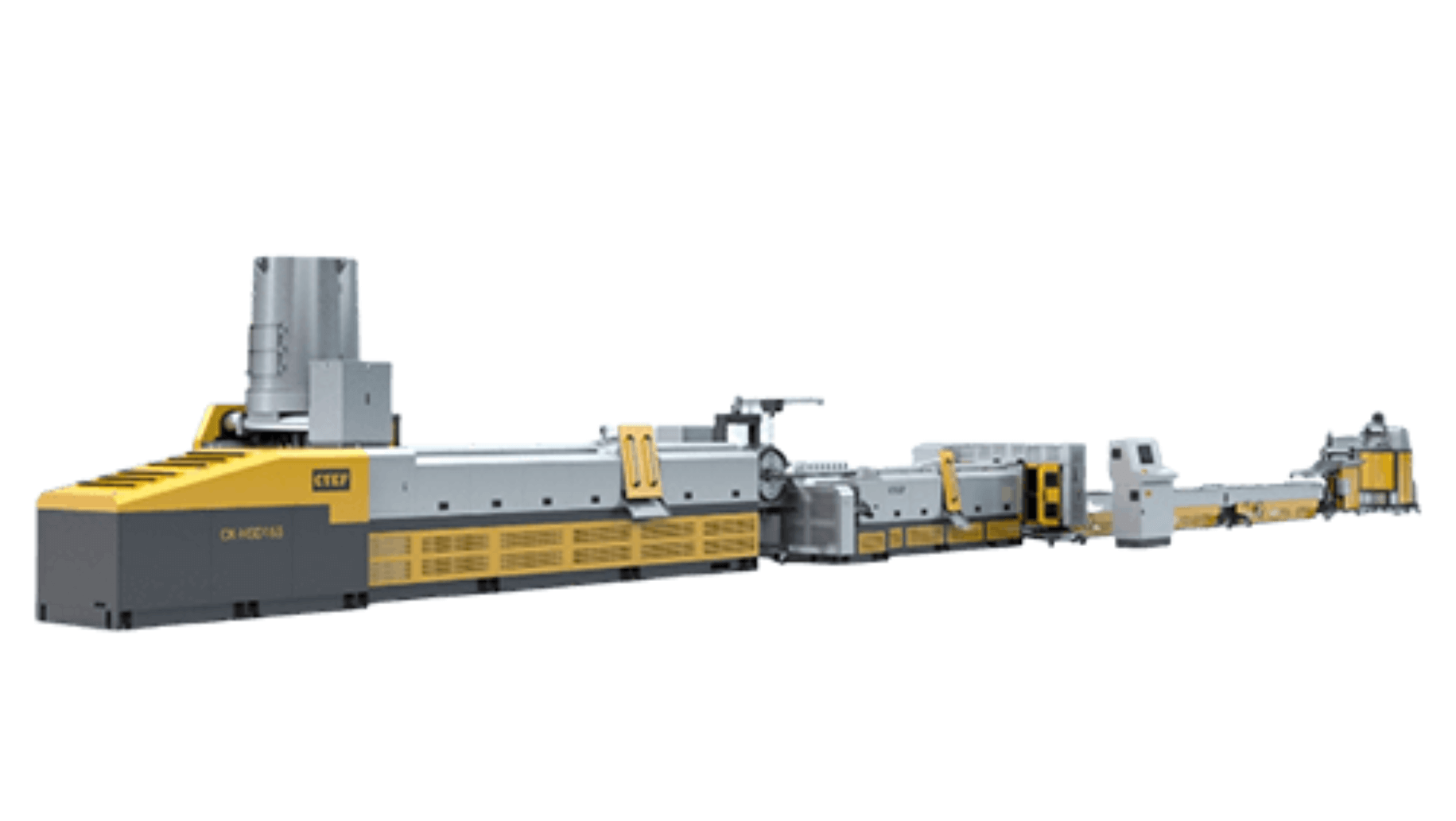HSD165 Double Section Recycling Pelletizing Extrusion Line
Introduction:
CYKF has established a double section recycling extrusion line to overcome site limitations and assist customers in reclaiming the value of washed plastic waste.
Background:
In undertaking a project from a major domestic recycling plant, CYKF identified that the customer has long been trading in both new and old materials. To align with emerging market demands, they aim to utilize a substantial inventory of recycled materials within the plant to produce recycled resin pellets. Due to the large production capacity required by the customer and the challenge of controlling the quality of the recycling process, the customer primarily used foreign-brand equipment for production. However, due to rising overseas maintenance and after-sales service costs in recent years, they sought collaboration with domestic manufacturers.
This project primarily focuses on recycling ABS washed recycled waste materials. These washed recycled materials retain numerous impurities and moisture that need proper handling. Furthermore, the customer demands that the recycled resin pellets be suitable for secondary processing, posing both a quality standard and the largest challenge in the recycling process.
Customer Requirements:
- Extrusion production line for washed recycled materials
- Minimum capacity of 1 ton per hour
- High-quality resin pellet output usable as secondary recycled materials for secondary processing
Solution/Machine Features:
I. Resecuring Dirty Material Recycling – CK-HSD Series
The CK-HSD series stands out among all single-screw extruders, specifically designed for relatively dirty recycled materials. Its major feature lies in the application of a mother-and-child extruder, effectively removing impurities and waste gases from recycled waste materials to obtain clean resin pellets.
Additionally, CYKF has designed special screws for the recycling extrusion process, reducing the loss of material properties during the process and effectively preserving material properties, enabling the produced resin pellets to be suitable for high-end processing applications.
Click the link to view the CK-HSD Series.
II. Streamlined Process, Revolutionary Design, Power Savings, and Increased Use Space
Drawing from years of design experience and expertise, CYKF proposes a revolutionary design that simplifies process requirements equipment while reducing equipment footprint.
This dual-stage recycling pellet production line features a side-feed hopper at the feed end, designed with internal blades to replace the function of a crusher, saving equipment horsepower needs and effectively preventing material accumulation during feeding.
Moreover, the CYKF team discovered limited space at the customer's premises during field visits. Hence, they abandoned the traditional perpendicular layout of mother-and-child machines, opting for a linear production design. This not only achieves a production capacity of 1.2 tons per hour but also allows the customer to retain more usable space within the factory.
III. Integration of Professional Filtration Systems, Reduced Manual Mesh Replacement Needs
For this project, CYKF integrates professional filtration systems from abroad with advantages of non-stop mesh replacement, reducing the need for personnel to replace filters. This system is suitable for high-yield recycling extrusion lines with a high presence of impurities.
For general-yield recycling extrusion lines, CYKF can adjust the mesh quantity according to the material, effectively filtering out impurities of various sizes from recycled materials.
IV. Configuration of Multi-stage Vacuum Systems, Effective Moisture Removal
Different recycling material processes have varying requirements for moisture content. Excessive moisture content can adversely affect the quality of resin pellets, reducing performance and potentially causing defects like bubbles during subsequent processing.
Due to ABS's tendency to absorb moisture, the moisture content significantly increases after washing. Hence, CYKF integrates a 3-stage vacuum system in the process to effectively remove waste gases and moisture from recycled materials, ensuring material stability.
View the CK-HSD120 Strip Cutting Granulation Video for reference.
V. Stable and Smooth Strip Cutting Process, Tank Temperature Control Ensuring Quality
This project incorporates the most widely used strip cutting granulation system, ensuring a stable and smooth process. The temperature control feature in the tank is excellent, preventing plastic strips from bending or fracturing due to excessive cooling or high temperatures.
Reference the CK-HSD165 Test Machine Video for more information.
Extension/Conclusion:
Global governments encourage companies to use recycled materials, not only to reduce costs but also to promote environmental sustainability. Consequently, the market demand for recycled resin pellets has been steadily increasing.
The greatest challenge in producing recycled resin pellets lies in effectively retaining material properties. Plastic materials tend to lose some properties with each processing cycle. Moreover, post-recycled products often contain impurities, varying in material specifications. Without proper processing, the quality of recycled resin pellets is easily compromised, making them unsuitable for new processes.
CYKF has long been committed to recycling issues, developing five recycling extrusion series for various recycling processes, including film recycling, optical-grade recycling, and waste yarn recycling. This project represents CYKF's longest recycling extrusion production line to date. For the first time, the team has successfully applied linear production to a dual-stage recycling pellet production line, maintaining high production indicators while ensuring excellent resin pellet quality and stable material properties suitable for secondary processing.
Explore CYKF's recycling applications here.


